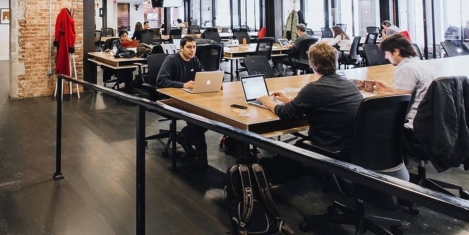June 7, 2018
Over half of employees say remote working and coworking increase their productivity
 More than half of US based employees (54 percent) with the chance to work remotely say they are most productive when they work outside a traditional office environment, such as at home, in a coffee shop, or in a coworking space, according to a new survey by research firm Clutch. Over two-thirds (68 percent) of workers surveyed work in a traditional office. However, higher productivity isn’t the only reason employees prefer other workspace options. Over a quarter (26 percent) of employees who have some degree of flexibility say a better work-life balance is the top benefit of working outside the office. Other benefits include flexible work hours (21 percent) and fewer distractions (18 percent).
More than half of US based employees (54 percent) with the chance to work remotely say they are most productive when they work outside a traditional office environment, such as at home, in a coffee shop, or in a coworking space, according to a new survey by research firm Clutch. Over two-thirds (68 percent) of workers surveyed work in a traditional office. However, higher productivity isn’t the only reason employees prefer other workspace options. Over a quarter (26 percent) of employees who have some degree of flexibility say a better work-life balance is the top benefit of working outside the office. Other benefits include flexible work hours (21 percent) and fewer distractions (18 percent).











 One in four workers (28 percent) would move jobs if they weren’t allowed to work from home, increasing to nearly half (45 percent) of millennial workers. Yet while two thirds of UK employees (65 percent) can work from home, 35 percent are still not given the option of working remotely.
One in four workers (28 percent) would move jobs if they weren’t allowed to work from home, increasing to nearly half (45 percent) of millennial workers. Yet while two thirds of UK employees (65 percent) can work from home, 35 percent are still not given the option of working remotely. 


 Organisations are failing to get the basics right when it comes to providing the digital and virtual systems that support employees in their roles, despite an evolving technological landscape and rise in flexible working, a new report has claimed. Data released by Leesman analyses how organisations can better support employees by offering the technology tools and infrastructure that enable people to work in a flexible way. In Deloitte’s 2018 Tech Trends report issued at the beginning of 2018, there was a heightened focus on how disruptive technologies will help businesses achieve larger strategic and operational goals and drive greater value. It predicted that within the next two years, more companies will embrace the emerging ‘no-collar workforce’ trend by redesigning jobs and reimagining how work gets done in a hybrid human-and-machine environment. However, Leesman’s findings show that, as of yet, organisations are failing to get the digital basics right. According to its latest dataset (Q1 2018) 23 percent do not agree that they have the technology tools and infrastructure that enable them to work in different locations across the office or from different locations outside of the office.
Organisations are failing to get the basics right when it comes to providing the digital and virtual systems that support employees in their roles, despite an evolving technological landscape and rise in flexible working, a new report has claimed. Data released by Leesman analyses how organisations can better support employees by offering the technology tools and infrastructure that enable people to work in a flexible way. In Deloitte’s 2018 Tech Trends report issued at the beginning of 2018, there was a heightened focus on how disruptive technologies will help businesses achieve larger strategic and operational goals and drive greater value. It predicted that within the next two years, more companies will embrace the emerging ‘no-collar workforce’ trend by redesigning jobs and reimagining how work gets done in a hybrid human-and-machine environment. However, Leesman’s findings show that, as of yet, organisations are failing to get the digital basics right. According to its latest dataset (Q1 2018) 23 percent do not agree that they have the technology tools and infrastructure that enable them to work in different locations across the office or from different locations outside of the office.








 The challenge to achieve gender equality at work isn’t made any easier by the attitudes of some employers. Although men increasingly want to be more present at home, currently fathers are
The challenge to achieve gender equality at work isn’t made any easier by the attitudes of some employers. Although men increasingly want to be more present at home, currently fathers are 










May 30, 2018
Australia is leading the world in the adoption of activity based working
by Max Luff • Comment, Flexible working, Workplace design
(more…)